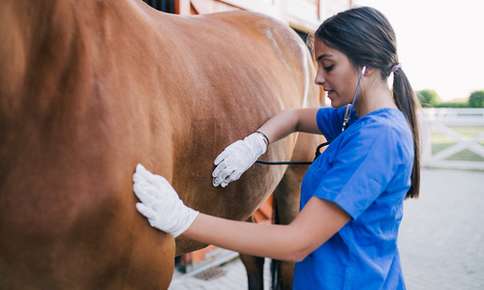
Common Horse Health Diseases
Do you know the symptoms of common equine diseases? Although coughing and runny noses are obvious signs of illness, other signs and symptoms may be more subtle. Fortunately, familiarizing yourself with the symptoms of these illnesses can help you ensure that your horse receives prompt veterinary treatment.
Rabies
All warm-blooded mammals, including horses, are at risk of developing rabies. Although the disease is nearly always fatal, it can be prevented with regular rabies vaccines. Symptoms of rabies may include lameness, loss of body control, incontinence, loss of appetite, trouble swallowing, colic, painful urination, change in personality and paralysis.
Eastern Equine Encephalitis (EEE)
EEE has a high mortality rate, killing 50 to 90 percent of affected horses, according to the State of New Jersey Department of Agriculture. The mosquito-borne virus can cause lethargy, disinterest in food, head tilt, inability to stand, limb paralysis, muzzle deviation, weakness, tremors, hyperexcitability, convulsions, facial paralysis, and colic. Yearly EEE vaccinations can help your horse avoid this devastating illness.
Coronavirus
Horses develop coronavirus after eating the feces of another horse infected with the virus. Although many infected horses don’t show symptoms of coronavirus, the illness can cause fever, colic, lack of appetite, depression, and diarrhea. Disposing of manure promptly can help prevent coronavirus infections in your horses.
Equine Influenza
A single cough or snort can send the influenza virus soaring through your barn. When other horses inhale the airborne virus, they may develop symptoms as soon as one day after exposure. Flu symptoms include fever, dry cough, nasal discharge and enlarged lymph nodes in the head and neck. Although most horses recover from equine influenza, the illness can be fatal in severe cases.
The influenza vaccine will help protect your horses from the latest strains of the virus. It’s also important to isolate sick horses at the first sign of possible influenza symptoms to prevent a widespread outbreak of the virus.
West Nile Virus
West Nile virus is also transmitted via the bite of a mosquito or insect and can cause serious neurological issues and even death. Affected horses may develop a low-grade fever, lose interest in food, have difficulty standing, and experience tremors, facial paralysis, tongue weakness, hyperexcitability, and other symptoms.
Equine veterinarians treat the symptoms of the disease, but as of yet, there is no cure for West Nile virus. Yearly vaccines are essential in protecting your horse. If you live in an area with a high incidence of the virus, your horse’s veterinarian may recommend twice-yearly vaccines.
Strangles
A strangles infection may make your horse uncomfortable for a few weeks, but it’s usually not fatal. The illness may cause coughing, wheezing, yellow or white nasal discharge, fever, trouble swallowing, throat inflammation and abscesses in the throatlatch and area below the jaw.
The disease is very contagious and is spread through direct contact or by touching contaminated surfaces. Giving your horse the Strangles vaccine, in addition to frequent cleaning of stalls, feeders, trailers, water containers, can reduce the risk of infection.
Equine Herpesvirus
Equine herpesvirus affects horses in different ways, depending upon the strain. Some types cause respiratory symptoms only, while others may cause respiratory illness, neurologic disease or spontaneous abortion (miscarriage). Vaccines are available to protect horses from the forms that cause respiratory illness or miscarriage.
Tetanus
Yearly vaccinations can help prevent your horse from ever contracting tetanus, a disease that causes severe muscle stiffness, spasms, full-body rigidity and death in many cases. Commonly called “lockjaw,” the disease often affects the muscles of the face and jaw, making eating or opening the mouth difficult. Although the disease is often fatal in unvaccinated animals, prompt treatment may save some animals.
Is your horse up-to-date on its immunizations? Vaccines offer a simple way to protect your equine from serious illness. Contact us if you’d like us to schedule a visit.
Sources:
FAZD Center: Diseases That Affect Horses, Ponies, Mules, and Donkeys
United States Department of Agriculture: Equine Herpesvirus, 1/12/18
Horse & Hound: Tetanus,1/14/19